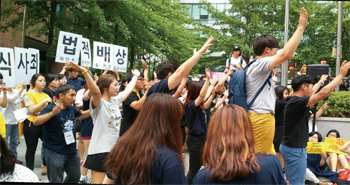NORTHEAST ASIAN HISTORY FOUNDATION 09/2014
-
Written by Hong Seok-jung, Freshman at Sejong High School, Seoul
Editor's Note: The Potent Camp, sponsored by AISEC 'Over HER Tears' and co-hosted by the Northeast Asian History Foundation and the Korean National Commission for UNESCO, was held from July 29 to 30, 2014 with the participation of young people at home and abroad. Here is an essay by Hong Seok-jung, one of the participants in this event.

As an would-be diplomat with a deep interest in the 'comfort women' issue and Korea-Japan relations, I signed up for the camp in the hope of broadening my horizons. The camp was a two-day event consisting of a visit to the House of Sharing and a participation in the Wednesday Rally. It provided a good opportunity for college students from countries around the world, including Korea, China, Tunisia, Hong Kong, Kazakhstan, and Indonesia, to present their thoughts and opinions about culture, change in women's rights, and 'comfort women,' and think about what they should do to resolve such issues
On the first day the participants visited the House of Sharing. The most memorable was the model of a 'comfort station' that I saw in the underground exhibition hall. The wooden stairs leading down to the basement made a creepy creaking sound with each step I took. The reason wood was used, the guide explained, even though it was not a good material to use for it rotted easily, was that it was the kind of wood that most of the 'comfort stations' run by the Japanese military were built with. I felt angry thinking of those young girls my age taken away from their homes and how scared and frightened they must have been left in the dark and damp room and listening to the sound of 'creaking' footsteps.
The late Ms. Kim Hak-sun, a former 'comfort woman,' had said, "What we were forced to do must go down in history." The former 'comfort women' who live in the House of Sharing try to correct the wrong facts by testifying their experience, even though they don't want to remember it ever again, and to prevent the repetition of such a tragic history.
Experience Deepened My Interest in 'Comfort Women'

Our participation in the Wednesday Rally was also a truly meaningful experience. Even though I had often seen the Rally on the news, it felt different once I joined the crowd. The 'comfort women' victims, students, and members of civil-society organizations spent over an hour in the sun (over 32 degrees Celsius) crying and demanding a proper apology from Japan. But Japan disregarded our cries, their windows covered with blinds, and I was resentful about their attitude because it felt as though they were trying to cover up their past wrongdoing.
The relations between Korea and Japan as two geographically, culturally, and historically close nations will become even more important. I don't think we should let our obsession with the past interfere with the future Korea-Japan relations. But that will be possibly only if Japan acknowledges their past wrongdoing and makes an apology first.
From this camp, I felt that publicizing the 'comfort women' issue to the international community is not a job limited to diplomats, civil-society organizations, or human rights activists, but something that demands attention from the youth as well. Furthermore, I believe that it is the duty of us young people as future leaders of the Republic of Korea to get actively involved in publicizing the issue to the world.


